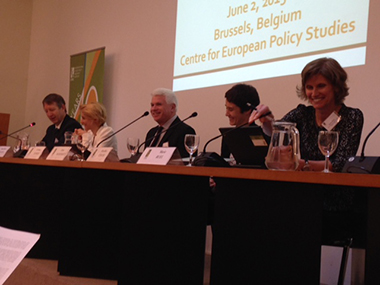Although we have successfully reached the Millennium Development Goal of halving extreme poverty and hunger at the global level, an estimated 795 million people continue to suffer from hunger while two billion suffer from micronutrient deficiencies. Making our food systems more nutritious, resilient, and inclusive can significantly improve the lives of millions of people living in poverty around the world.
A group of stakeholders and experts on food systems recently gathered to discuss this need at an event in Brussels at an event co-hosted by the German Federal Ministry for Economic Cooperation and Development (BMZ), the European Commission (EC), and the International Food Policy Research Institute (IFPRI). About 80 participants from civil society organizations, the public and private sectors, academia, and the donor community, among others, debated how to translate research into action on three critical themes: Enhancing Nutrition in Food Systems, Building More Resilient and Sustainable Food Systems, and Prioritizing Gender for More Inclusive Food Systems.
The event produced a rich exchange of insights, recommendations, and priorities for improving food systems with the goal of ending hunger and undernutrition in the coming decade. Participants agreed that greater convergence among diverse actors, sectors, and stakeholders is needed to produce innovative solutions for more nutritious, resilient, and inclusive food systems; and gaps between research-based evidence, policies and programs, and impact on the ground must be identified and filled.
In addition, the experts and stakeholders in attendance agreed on specific recommendations for moving forward:
- strengthen local and national level research systems;
- engage more strategically and systematically with stakeholders;
- learn from both policy successes and failures; and
- effectively communicate research to all members of society.
These ambitious but necessary recommendations address some of the most pressing challenges to effectively translating research into improved nutrition-, people- and planet-sensitive food systems. The global community has made progress in achieving MDG targets, but much work remains to eliminate hunger and undernutrition and achieve the soon-to-be adopted Sustainable Development Goals by the year 2030.







